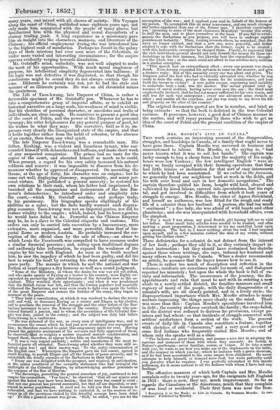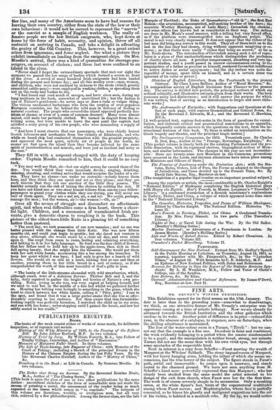MRS. MOODIE'S LIFE IN CANADA..
This work contains an interesting account of the disagreeables, struggles, and hardships in Canada, of a family that ought never to have gone there. Captain Moodie was unversed in business and unaccustomed to labour. Mrs. Moodie, as the saying is, " had never known what it was to soil her hands." The captain was lucky enough to buy a cheap farm; but the majority of his neigh, hours were low Yankees ; the few intelligent English " were al, ways so busily occupied with their farming operations that they had little leisure or inclination for that sort of easy intercourse to which he had been accustomed. If we called in the forenoon, we generally found our neighbour hard at work in the fields, and his wife over head and ears in her domestic occupations." The captain therefore quitted his farm, bought wild land, cleared and cultivated by hired labour, entered into speculations, lost his capi- tal, and got involved in difficulties from which it took years of struggle to emerge. Mrs. Moodie, the sister of Agnes Strickland, and herself an authoress, was less fitted for the rough and ready life of a colonist than her husband. A poetess, she had too much " sentiment" ; a fine lady, she was afraid of wild beasts and other phantasies ; and she was unacquainted with household affairs, even the simplest.
" For a week I was alone, my good Scotch girl having left me to visit her father. Some small baby articles were needed to be washed, and after making a great preparation, I determined to try my unskilled hand upon the operation. The fact is, I knew nothing about the task I had imposed upon myself, and in a few minutes rubbed the skin of my wrists, without getting the clothes clean."
These deficiencies for a colonist do not detract from the interest of her book ; perhaps they add to it, as they certainly impart in- direct instruction : but they should have restrained her diatribe against those whose writings, she says, induced her husband and many others to emigrate to Canada. When a dealer recommends an article, he assumes that the buyer knows how to use it.
There is rather too much of description and reflection in the volumes; incidents are sometimes made too much of, and dialogues reported too minutely ; but upon the whole the book is full of va- riety and information. The occurrences of the journey, the dis- appointments and rubs that must be met with in entering a new abode in a newly-settled district, the familiar manners and small roguery, of many of the people, with the daily disagreeables of a colonist's wife, are all clearly painted, and in a lively style ; the disproportioned importance which Mrs. Moodie attaches to many matters impressing the things more clearly on the mind. There was more than this : Captain Moodie's speculations involved him in debt; the country sickness overtook the family; the crops failed, and the district was reduced to distress for provisions, except po- tatoes and bad wheat : so that incidents of struggle connected with settlers' misfortunes form a section of the work. The general events of daily life in Canada also constitute a feature, together with sketches of odd " characters," and a very good account of some Red Indians who frequently visited Mrs. Moodie; and of whom only she speaks well as a class. "The Indians are great imitators, and possess a nice tact in adopting the customs and manners of those with whom they associate. An Indian is Nature's gentleman—never familiar, coarse, or vulgar. If he take a meal withyou, he waits to see how you make use of the implements on the table, and the manner in which you eat; which he imitates with a grave decorum, as if he had been accustomed to the same usages from childhood. He never attempts to help himself, or demand more food, but waits patiently until you perceive what he requires. I was perfectly astonished at this innate politeness, for it seems natural to all the Indians with whom I have had any dealings." The offensive manners of which both Captain and Mrs. Moodie complain refer to twenty years ago, for the emigrants left England in 1832: there is now, they say, much improvement. So far as regards the Canadians or the Americans, much that they complain of was local or accidental. Their first farm was near the fron-
• Roughing it in the Bush; or Life in Canada. By Susanna Moodie. In two volumes. Published by Bentley.
tier line, and many of the Americans seem to have had reasons for leaving their own country, either from the state of the law or their own behaviour: it would not be correct to represent the " navvie " or the convict as a sample of English workmen. The really of- fensive people are the low British emigrants, -who, kept down at home by the force of habit, necessity, and opinion, throw off all restraint on arriving in Canada, and take a delight in affronting the gentry of the Old Country. This, however, to a great extent arises from ignorance, and home neglect. See what a picture they exhibit immediately on landing from the emigrant-ships. On Mrs. Moodie's arrival, there was a kind of quarantine forsteerage-pas- sengers, on account of cholera; and these last were confined to an island in the river.
"Never shall I forget the extraordinary spectacle that met our sight the moment we passed the low range of bushes which formed a screen in front of the river. A crowd of many hundred Irish emigrants had been landed during the present and former day; and all this motley crew—men, women, and children' who were not confined by sickness to the sheds (which greatly resembled cattle-pens)—were employedin washing clothes, or spreading them * out on the rocks and bushes to dry.
"I had heard and read much of savages, and have since seen, during my
long residence in the bush, somewhat of uncivilized life; the Indian is one of Nature's gentlemen—he never says or does a rude or vulgar thing. The vicious uneducated barbarians who form the surplus of over-populous Furopean countries, are far behind the wild man in delicacy of feeling or riatural courtesy. The people who covered the island appeared perfectly des- titute of shame, or even of a sense of common decency. Many were almost naked, still more but partially. clothed. We turned in disgust from the re- volting scene, but were unable to leave the spot until the captain had satisfied a noisy group of his own people, who were demanding a supply of stores.
"And hero I must observe that our passengers, who were chiefly honest Scotch labourers and mechanics from the vicinity of Edinburgh, and who while on board ship bad conducted themselves with the greatest propriety, and appeared the most quiet, orderly set of people in the world, no simper set foot upon the island than they became infected by the same spirit of insubordination and misrule, and were just as insolent and noisy as the rest."
They fell in with a sergeant charged with the duty of keeping order. Captain Moodie remarked to him, that it could be no easy task.
"You may well say that, sir—but our night scenes far exceed those of the day. You would think they were incarnate devils ; singing, drinking, dancing, shouting, and cutting antics that would surprise the leader of a cir- cus. They have no shame—are under no restraint—nobody knows them here, and they think they can speak and act as they please ; and they are such thieves that they rob one another of the little they possess. The healthy actually run the risk of taking the cholera by robbing the sick. If you have not hired one or two stout honest fellows from amongyour fellow- passengers to guard your clothes while they are drying, you will never see half of them again. They are a sad set, sir, a sad set. We could, perhaps, manage the men ; but the women, Bid—the women !—Oh, air !"
Over all the scenes of struggle and discomfort an affectionate spirit, and when real difficulties come a firm heart, throw a cheer- 1.1ight. Children, and a succession of warmhearted Irish ser- vants, give a domestic charm to roughing it in the bush. This
tare of the eldest-born little Katie is a pleasing bit of something better than pastoraL " The next day, we took possession of our new mansion ; and no one was better pleased with the change than little Katie. She was now fifteen months old, and couldjust begin to prattle ; but she dared not venture to step alone, although she would stand by, a chair all day, and even climb upon it. She crept from room to room, feeling and admiring everything, and talking to it in her baby language. So fond was the dear child of flowers, that her father used to hold her up to the apple-trees, then rich in their full spring beauty, that she might kiss the blossoms. She would pat them with her soft white hands, murmuring like a bee among the branches. To keep her quiet whilst I was busy, I had only to give her a bunch of wild flowers. She would sit as still as a lamb, looking first at one and then at another, pressing them to her little breast in a sort of ecstacy, as if she comprehended the worth of this most beautiful of God's gifts to man. r at• " The haulm of the little streams abounded with wild strawberries, which, although small, were of a delicious flavour. Thither Bell and I, and the baby, daily repaired to gather the bright red berries of Nature's own pro- viding. Katie, young as she was, was very expert at helping herself, and we used to seat her in the middle of a fine bed whilst we gathered farther on. Hearing her talking very lovingly to something in the grass, which she tried to clutch between her white hands, calling it Pitty, pitty,' I ran to the spot, and found that it was a large garter-snake that she was so affec- tionately courting to her embrace. Not then aware that this formidable- looking reptile was perfectly harmless, I snatched the child up in my arms, and ran with her home • never stopping until I gained the house, and saw her safely seated in her cradle."



























 Previous page
Previous page